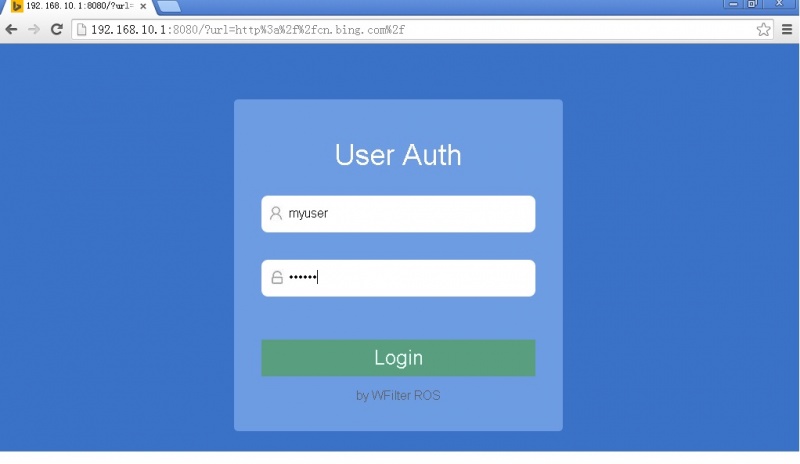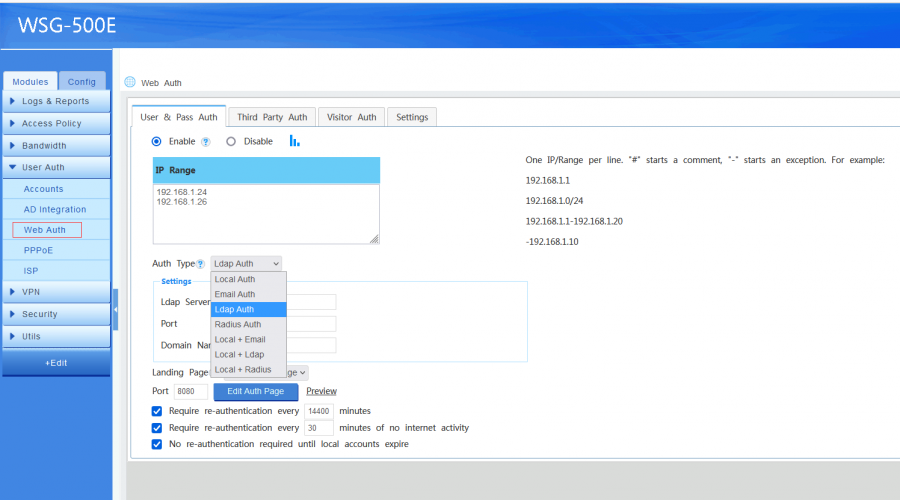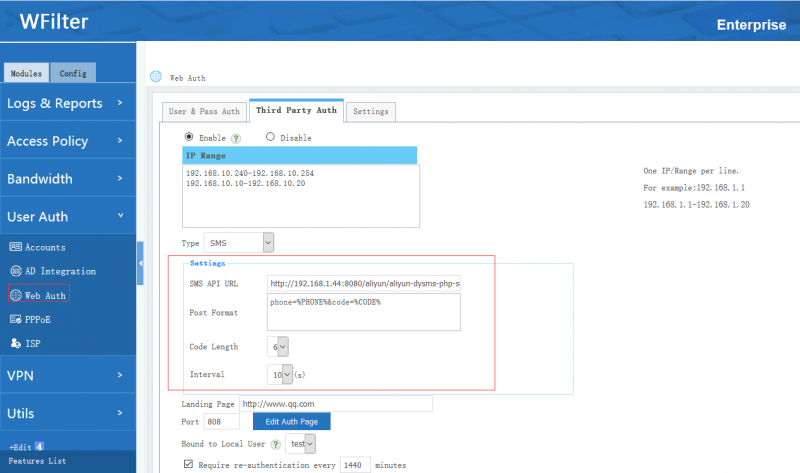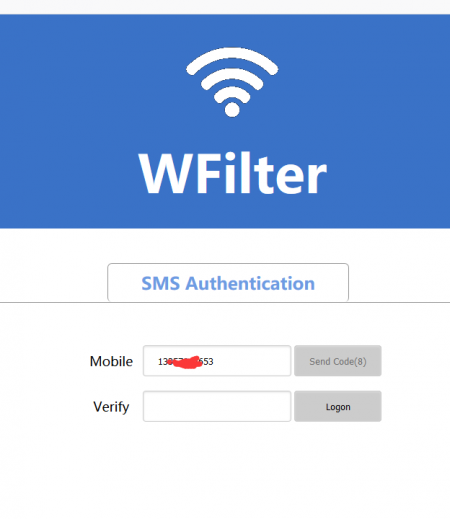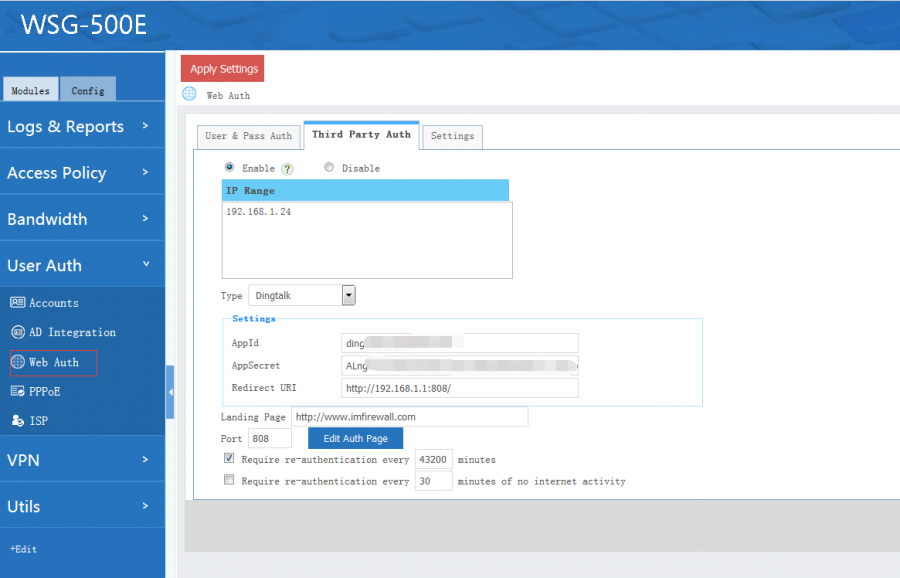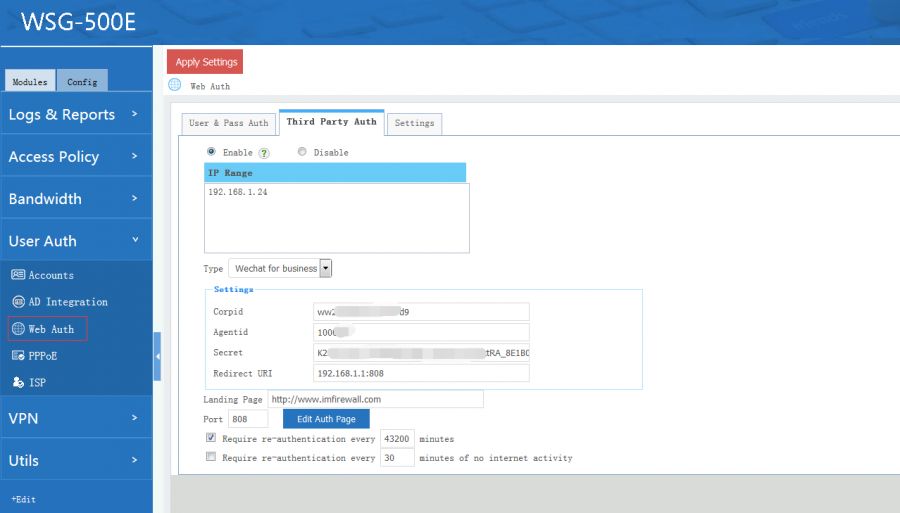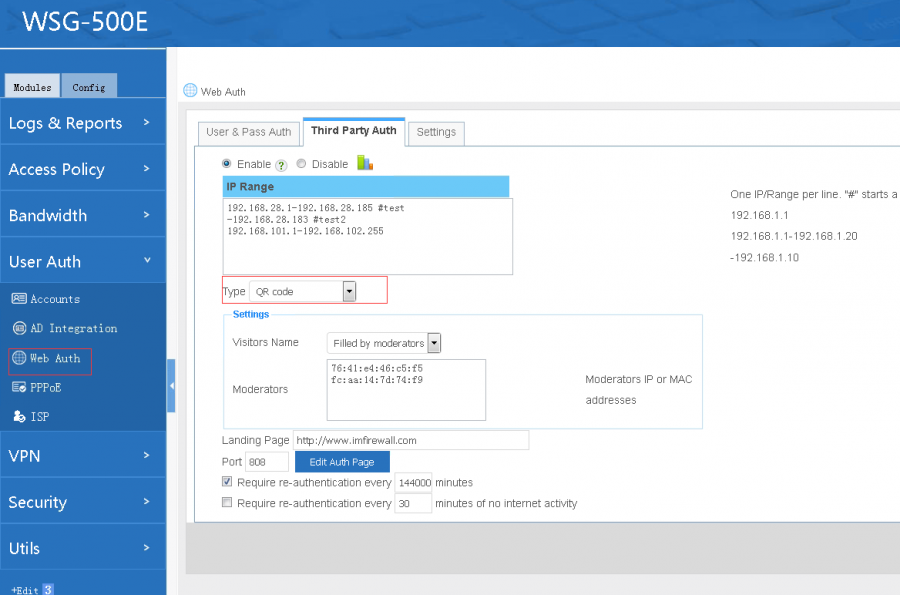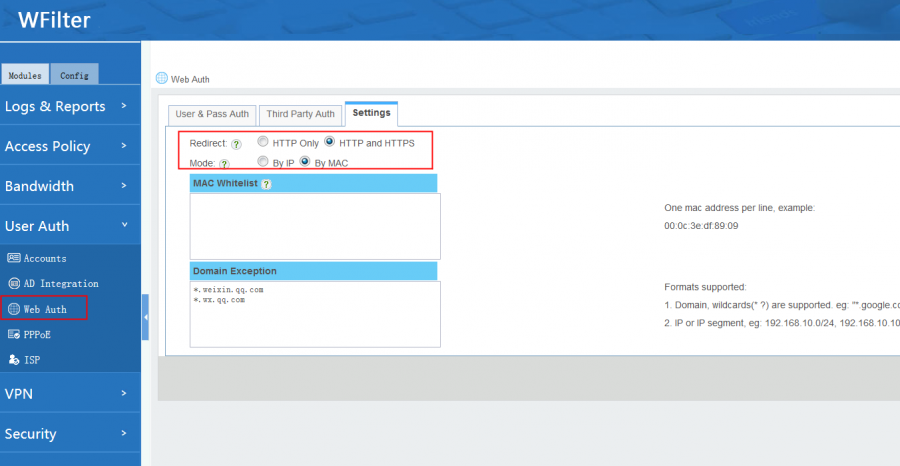Webauth
From Wiki of WFilter NG Firewall
(Difference between revisions)
| Line 4: | Line 4: | ||
* "User & Pass Auth": correct username and password are required to access internet. You can use WFilter local accounts service or third party services(Email, LDAP, Radius) for authentication. | * "User & Pass Auth": correct username and password are required to access internet. You can use WFilter local accounts service or third party services(Email, LDAP, Radius) for authentication. | ||
* "Third Party Auth": interface for third party authentication. The authentication logic is done via a third party service. For example: | * "Third Party Auth": interface for third party authentication. The authentication logic is done via a third party service. For example: | ||
| − | |||
| − | |||
** SMS authentication | ** SMS authentication | ||
** Dingtalk | ** Dingtalk | ||
** Wechat for business | ** Wechat for business | ||
| + | ** QR code | ||
Together with other modules, you can: | Together with other modules, you can: | ||
* Display usernames for client devices.(Real-time Bandwidth) | * Display usernames for client devices.(Real-time Bandwidth) | ||
| Line 36: | Line 35: | ||
== Third Party Auth == | == Third Party Auth == | ||
| − | * Landing page: default landing page after | + | * Landing page: default landing page after user authentication. |
* Port: listening port of the authentication page. | * Port: listening port of the authentication page. | ||
* Edit Auth Page: edit content of the authentication page. | * Edit Auth Page: edit content of the authentication page. | ||
* Bound to a local user: bound the authenticated user to a local user. So you can set policy and get reports of the "third party authed users". | * Bound to a local user: bound the authenticated user to a local user. So you can set policy and get reports of the "third party authed users". | ||
| − | |||
| − | |||
| − | |||
| − | |||
| − | |||
| − | |||
| − | |||
| − | |||
| − | |||
| − | |||
| − | |||
| − | |||
| − | |||
| − | |||
| − | |||
| − | |||
| − | |||
| − | |||
| − | |||
| − | |||
| − | |||
| − | |||
=== SMS WiFi === | === SMS WiFi === | ||
| Line 86: | Line 63: | ||
[[File:Faq_webauth_bwechat.png|900px]] | [[File:Faq_webauth_bwechat.png|900px]] | ||
| + | |||
| + | === QR Code === | ||
| + | |||
| + | When enabled, a visitor shall show a QR code, which needs to be checked by a moderator. | ||
| + | |||
| + | [[File:Faq_webauth_qrcode.png|900px]] | ||
== Settings == | == Settings == | ||
Revision as of 13:54, 15 July 2020
Contents |
1 Introduction
"Web Auth" brings you below features:
- "User & Pass Auth": correct username and password are required to access internet. You can use WFilter local accounts service or third party services(Email, LDAP, Radius) for authentication.
- "Third Party Auth": interface for third party authentication. The authentication logic is done via a third party service. For example:
- SMS authentication
- Dingtalk
- Wechat for business
- QR code
Together with other modules, you can:
- Display usernames for client devices.(Real-time Bandwidth)
- Record internet activites by username.(Logs & Reports)
- Set access policy by username.(Access Policy)
- Query webauth login history.(Accounts)
2 User & Pass Auth
When enabled, clients in the target ip ranges will be required for username and password when browsing webpages.
Settings:
- IP Range: ip ranges to enable "User & Pass Auth".
- Auth Type
- "Local Auth": authenticate with username and password of local accounts. This user shall enable "Web" access in Local_Account.
- "Email Auth": send credentials to a pop/imap email server for authentication.
- "Ldap Auth": send credentials to a ldap server for authentication.
- "Radius Auth": send credentials to a remote radius server for authentication.
- "Local + Email": local authenticate first, if not found, try email authentication.
- "Local + Ldap": local authenticate first, if not found, try ldap authentication.
- "Local + Radius": local authenticate first, if not found, try radius authentication.
- Timeout: re-authentication is required on timeout.
3 Third Party Auth
- Landing page: default landing page after user authentication.
- Port: listening port of the authentication page.
- Edit Auth Page: edit content of the authentication page.
- Bound to a local user: bound the authenticated user to a local user. So you can set policy and get reports of the "third party authed users".
3.1 SMS WiFi
When SMS is enabled, users need to input a correct verification code which is received via mobile phone text message. Settings:
- SMS API URL: web API URL to send SMS.
- Post Format: the message format POST to SMS web API.
- Code Length: verification code length.
- Interval: interval of re-sending verification code.
3.2 Dingtalk
When enabled, the clients can login by QR code scanning with dingtalk app.
3.3 Wechat for business
When enabled, the clients can login by QR code scanning with business wechat app.
3.4 QR Code
When enabled, a visitor shall show a QR code, which needs to be checked by a moderator.
4 Settings
- Redirect: Redirect unauthorized traffic to the web portal.
- HTTP Only, only redirect HTTP traffic, HTTPS access will be blocked.
- HTTP and HTTPS: both types traffic will be redirected. Please note: HTTPS authenticate port will be HTTP port plus one. To remove certificate warning, please install the ca certificate in SSL Inspector.
- HTTPS redirection doesn't work in "pass-by deployment".
- Mode:
- If your core switch is three layer and "mac address collector" is not enabled, you need to use "by IP" mode.
- Otherwise, "by MAC" mode is recommended.
- MAC White List: mac addresses in this list do not require authentication.
- Domain Exception: domains in this list can be visited without authentication.
- IP address, eg: 192.168.1.100
- IP segment, eg: 192.168.1.0/24
- Domains, eg: *.google.com, wildcards(*?) are supported.
